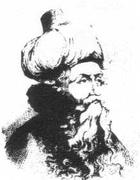
Abū Bakr Muhammad ibn 'Alī ibn' Arabi (Arabic أبو بكر محمد بن علي ابن عربي الحطمي) (Murcia, July 28, 1165 - Damascus, November 16, 1240), better known as Ibn Arabi, Arabi was Abenarabi and Ben a Sufi mystic, philosopher, poet, traveler and Andalusian Muslim scholar. His major contributions in many different fields of Islamic religious sciences have earned him the nickname Quickening of Religion (Arabic محيي الدين Muhyi al-Din) and The Ultimate Doctor (Arabic الشيخ الأكبر as-Shaykh al-Akbar) . Is probably the most influential figure in the history of Islamic mysticism. Born in Murcia, Murcia father of Berber mother, moved with his family to Seville at the age of 7 years. His youthful literary studies elapsed between Lora del Rio and Carmona.
The thirst for knowledge led Ibn Arabi to a traveling life, touring their first native Al-Andalus and North Africa after visiting the different Sufi groups. Later visited Cairo and Jerusalem. After two years of spiritual emotions in Mecca decided to continue trip to Baghdad, Mosul, Konya (ancient capital of the Sultanate of Rum and a city of modern Turkey) and Damascus, where he finally settled for 17 years until his death. His tomb, which were then buried two of his sons, is still preserved and pilgrimage to the Muslim world. On his grave the Ottomans built a madrasa where his grave is kept.




